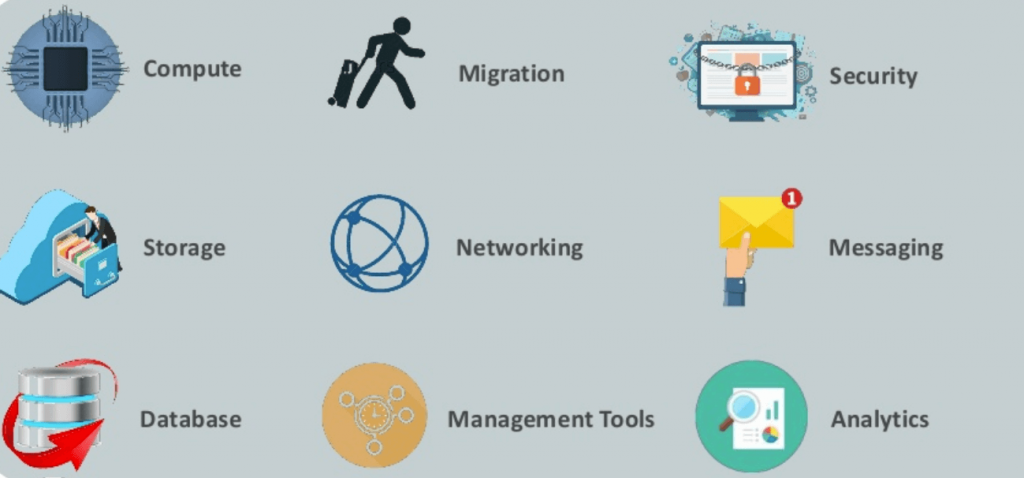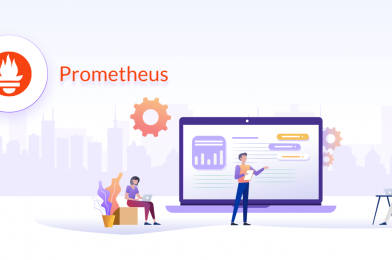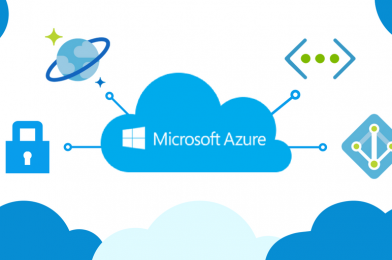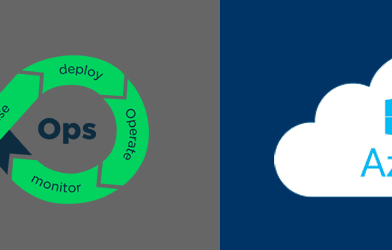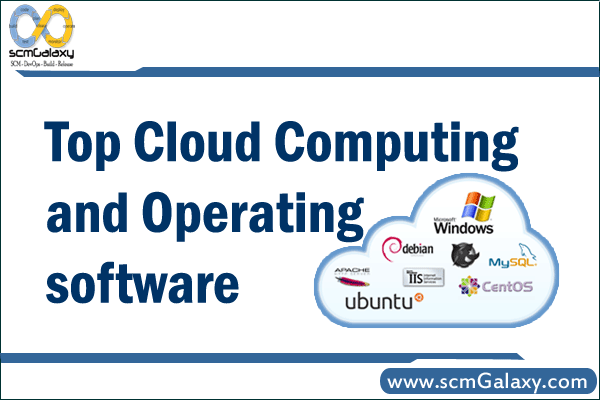Tag: Cloud computing
Is an AWS certification right for a beginner?
Whether you’re someone looking to take your career to the next level into a new domain, getting into cloud and acquire skills of cloud through getting the AWS certification can be a good option to start your life-changing career. But AWS have variety of different Certification to offer. But the question is where to start and which Certification is good for as a beginners.
In this blog i will try to give an appropriate answer about that question, importance of AWS Certification, Career scope and more. But first let’s take about AWS in brief.
What is AWS?
Amazon Web Services (AWS) is a secure cloud services platform, offering compute power, database storage, content delivery and other functionality to help businesses scale and grow. It is a subsidiary of Amazon providing on-demand cloud computing platforms.
AWS has significantly more services, and more features within those services, than any other cloud provider–from infrastructure technologies like compute, storage, and databases–to emerging technologies, such as machine learning and artificial intelligence, data lakes and analytics, and Internet of Things. AWS has the largest and most dynamic community, with millions of active customers and tens of thousands of partners globally.
Certification offer by AWS

Some advantages of having an AWS certification:
- Credibility
Having a certification will not only increase your knowledge about the services but also increase your credibility. Acquiring credentials will open more doors of opportunities.
- Help you get a job
If you’re a professional or a fresher the tag as “AWS Certified” will fetch you a lot of job opportunities in AWS-related projects.
- Higher Pay
The AWS certification does not guarantee a higher pay but AWS is the highest paying certifications list in the US.
- Improves skills
Having an AWS certification helps you to improve your skill set and reduce the risks when implementing an AWS project.
- Helps you build the business
Employers look for AWS certified employees as they help in building a business. It is one of the criteria for higher tier memberships of AWS Partner Network.
- Huge benefits
Being a member of the AWS Partner Network helps you get training subsidies, AWS usage credit, market support, etc.
Where to Start
If you aren’t sure where to start, Best institute are a great way to help you get the ball rolling in your cloud certification journey, they offering comprehensive AWS certification course led by the experts in the programme. They trained and prepare you for the AWS certification exam. You will also learn the best practices to be followed while working on AWS projects in the industry.
If you want to learn AWS from scratch to Advance then I would like to suggest you DevOpsSchool.com, one of the best institute for AWS Certification. This Certification is completely hands-on and designed in a way to help you become technical expertise of AWS. Both in online and offline mode in top cities like Bangalore, Hyderabad and Globally.
I hope you find this particular blog on AWS helpful, and I wish you good luck for your career ahead.
Thank You!!
What is the difference between Azure and AWS?
Amazon Web Services (AWS) and Microsoft Azure are two of the biggest names in public cloud computing. For example, if an organization is in need of a strong Platform-as-a-service (PaaS) provider or needs Windows integration, Azure would be the preferable choice while if an enterprise is looking for infrastructure-as-a-service (IaaS ) or diverse set of tools then AWS might be the best solution.
In this particular blog we will going to discuss about the differences between AWS and Azure, taking a look on various aspect, and then we see for better choice?
What is Azure?
Azureis the primary interface for managing apps, services and solutions commissioned on the Azure platform. This feature-rich web application allows you to interact with Azure services through a rich web-based interface, building, managing, and monitoring everything from simple web apps to complex cloud applications in a single, unified console.
Advantages of Azure
Here are some advantages of adopting Azure cloud services:
- Capability for developers and users to create, maintain and deploy applications
- Fully scalable cloud computing platform offers open access across multiple languages, frameworks, and tools
- Total support for Microsoft legacy apps
- Support for mixed Linux/Windows environments
- Offers inbuilt tool like Azure stack to help the organization deliver Azure service from the own data centre.
What is AWS?
Amazon Web Services (AWS) is a secure cloud services platform, offering compute power, database storage, content delivery and other functionality to help businesses scale and grow. It is a subsidiary of Amazon providing on-demand cloud computing platforms.
Advantages of Azure
Here are some advantages of AWS cloud services:
- Compute Cloud allows you to increase or decrease storage according to the need of your organization
- AWS enables you to select an operating system, programming language, database of your choice
- Robust partner ecosystem
- Broad & deep service offerings
- High Transfer Stability
- Offers more data centres for availability and low latency
- Stronger support for Bl and analytics
- Better DevOps support
What are the differences between AWS and Azure?

| Parameters | AWS | Azure |
| Launched Date | Launched in 2006. | Launched In 2010. |
| Market Share | 31% Share of the global computing market | 11% Share from the worldwide market. |
| Availability Zone | 61 Availability Zone | 140 Availability Zones |
| Storage services | S3 Buckets EBS SDB domains Easy to use SQS CloudFront AWS Import/Export | Blob Storage Containers Azure Drive Table Storage Tables Storage Stats |
| Databases Services | MySQL Oracle DynamoDB | MS SQL SQL Sync |
| Deployment Services | Amazon Web Services Amazon Machine Instance (AMI) Traditional Deployment Models Fine-grained updates Elastic Beanstalk Cloud Formation | Cspkg (fancy zip file) Upload via portal or API via blob storage Course-grained updates “click to scale.” More magic |
| Networking Services | IP/Elastic IP/ELB Virtual Private Cloud Route 53 ELB Firewall heavily configurable | Automatic IP assignment Load-balancing Azure Connect Balancing Endpoints defined in csdef/cscfg |
| Price | Per hour- rounded up | On-demand reserved spot. |
| Customers | Adobe, Airbnb, Expedia, Yelp, Nokia, Netflix, Novartis. | Pearson, 3M, Towers Watson, NBC, Essar, Serko, etc. |
| Type of Cloud | Virtual Private Cloud (VPC) | Virtual Network |
| Connection type | Direct Connect | ExpressRoute |
| Pricing models | Free Tier Per Hour Free Trial Per Minute No change for stopped Pay for EBS volume | Free Trial Per Minute |
| Government Cloud | AWS has an edge as far as government cloud offerings. | Limited reach for government cloud offerings. |
| Support for Hybrid cloud | Does not offers the best of hybrid cloud support. | With Hybrid Cloud, organizations can integrate onsite servers with Cloud instances. |
| Ecosystem | AWS has a software marketplace with an extensive partner ecosystem. | With very few Linux options, Azure doesn’t’ have a big ecosystem. |
| Support for Big Data | EBS storage is ideal for handling big data. | Standard storage has many issues for big data, and therefore you need premium storage. |
| Maturity | More mature cloud environment for big data. | The less mature environment for big data. |
| Machine access | In AWS machine can be accessed separately. | Machines are grouped into cloud service and respond to the same domain name with various ports. |
| Salary | The average salary for “AWD engineer” is approximately $141,757 per year for Software Architect. | The average salary for “Microsoft Azure” ranges from approximately $113,582 per year. |
| Key features | Zero setups, Detail Monitoring, Auto-scaling groups. | Start-up friendly, High performance, Low cost. |
| Long term data archiving | Allows long term data archiving and retrieval. | Does not offer any long term data archiving and retrieval option. |
| Security | Security is provided using defined roles with permission control feature. | Provides security by offering permissions on the whole account. |
Conclusion
Comparing Azure and AWS is extremely difficult as both continue to launch new pricing structures, new products, and new integrations. Microsoft Azure has increased its market share in the last couple of years, but not to an extent where there is a real contest between the two companies at least for the near future.
The decision to choose either of the platforms depends on the needs of organizations how AWS vs Azure comparison meets those requirements.
Therefore, the final selection will be depend on the need of your organization.
I hope this particular blog is helpful and informative about AWS and Azure, If you want to learn AWS and Azure, then I would like to suggest you DevOpsSchool.com, one of the top institute for AWS and Azure Certification both online and offline mode in top cities like Hyderabad, Bangalore and Globally too.
Thank you.
Why should I learn AWS?
Hello people, today’s article is based on “why should I learn AWS” first of all we will discuss here that what AWS is, why is it important to us, how does it works, why should we learn AWS and last but not the least we will discuss the benefits of AWS. So, without wasting any time let’s start with our today’s article…
What is AWS?
The AWS is a complete, developing and cloud computing platform that is delivered by Amazon that includes a mixture of substructure as a service (IaaS), a platform as a service (PaaS) and enfolded as a package as a service (SaaS) contributions. The AWS services will provides a proposal to a goggle tools like figure power, info storage and content delivery services.
The AWS (amazon web services) provides many varieties of various tools and solutions for creativities and package developers that might be utilized in information centres in countries. The teams like administration agencies, the education organizations, non-profits and personal organizations etc. may also use the AWS services.
How AWS works?

The AWS is alienated into dissimilar services as it is designed in various ways that supported the user’s needs. The Users ought to be gifted to piece the alternatives associated with distinct server maps for an AWS service.
But many services comprise to the Amazon net Services assortment which has those for cipher, databases, infrastructure running and conjointly for the applying development and security. These services, by categorized as follows:-
• For Computing.
• For storing databases.
• For the information management.
• For Migration.
• For Hybrid cloud.
• For Networking.
• For Development tools.
• For Management.
• For watching.
• For the safety.
• For the Governance.
• For huge knowledge management.
• For the Analytics.
• For computing (AI).
• For Mobile development.
• For Messages and notification.
What are the importance of AWS?
The AWS courses provide immersive knowledges of which inspires learners to smartly assume, question, and information conclusions. Different the many PowerPoint displays and room recordings, the AWS courses embrace animated graphics, audio tale, video footage, and communication components that build even the foremost multifarious topics each engaging and simple to know. This course additionally covers the way to produce unexperienced buildings and build them into strong and adjusted solutions.
• It manages multiple AWS accounts for your organization.
• It Connect on-premises datacenter to AWS cloud.
• It Discuss asking insinuations of connecting multi-region VPCs.
• It Moves giant information from on-premises datacentre to AWS.
• It styles an outsized information stores for AWS cloud.
• It perceive totally different field styles for climb an outsized web site.
• It shield your setup from DDoS attack.
• It secures your information on AWS with encoding.
• It styles protection of data-at-rest additionally as data-in-flight.
• It enhances the performance of your solutions.
Why should we learn AWS?
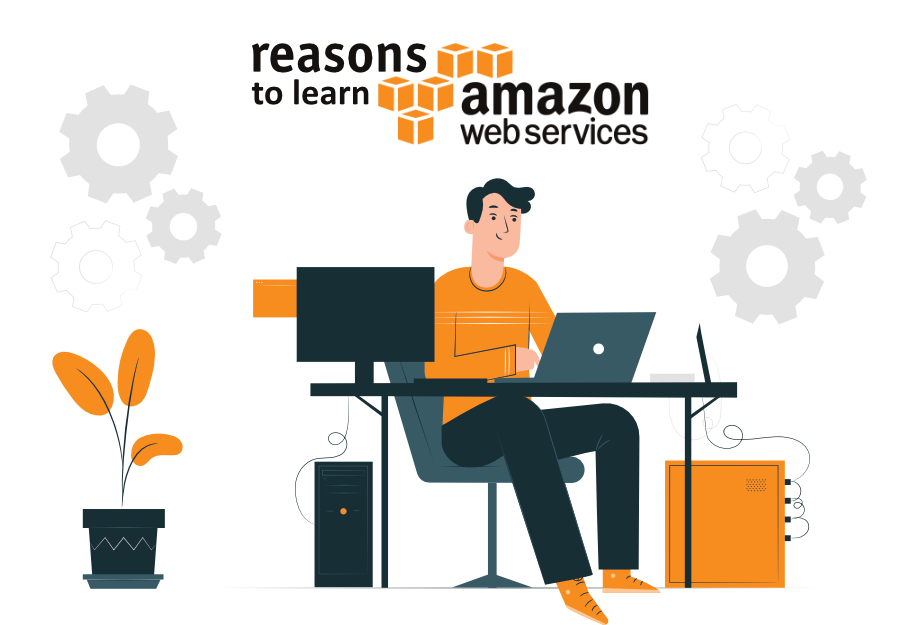
The AWS provides the best level of information privacy and security to its customers in spite of their business size. It does not matter whether or not you’re running a tiny low start-up or an outsized business AWS has in depth security support that offers period of time insight on suspicious activity and potential vulnerabilities.
It allows organizations to achieve further coaching and resources (technical, business, sales, and marketing) which will higher serve their customers exploitation AWS services. A lot of certifications a corporation has, the upper the advantages they will access through the layer AWS Partner Network.
Learning these core services can provide you with an honest understanding of however AWS approaches security, networking, knowledge storage, and cypher capability.
Presently, cloud computing has taken the technical world to a brand new level. Cloud computing additionally provides safe access to the servers, storage, databases and offers plenty of application services over the web.
What are the benefits of learning AWS?
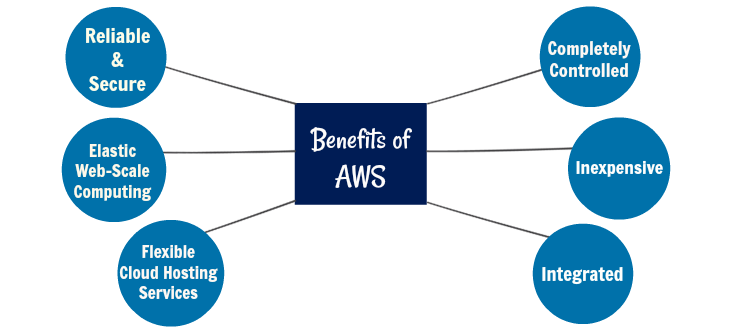
The next discussion would set up 10 dissimilar AWS certification blessings. This feature of the discussion would build the inspiration for telling the positive consequences connected with AN AWS certification communication. The advantage of AWS is that companies solely have to be compelled to pay money for the services that they use. The AWS services facilitate businesses to make complete substructure. The total application surroundings facilitate businesses to run applications while not the requirement for physical hardware. As a result, businesses may be ready to cut back their incidentals aboard guaranteeing the measurability of processes. The advantage of AWS is that companies solely have to be compelled to pay money for the services that they use. The AWS services facilitate businesses to make whole infrastructure. The total application environments facilitate businesses to run displays while not the requirement for physical hardware. As a result, companies may be ready to decrease their prices besides safeguarding the measurability of operations.
• For the Preparation for the longer term.
• For the new streets for developing skilled experience.
• To Gain AN appreciation for your labours.
• To show your commitment levels.
• To restricted difficulties to clear AWS certification.
• For a more robust pay check.
• A possibilities to expand skilled network.
• The Employers conjointly get advantages.
Conclusion:-
So here we are! As of now we had come to an end of this article, hope you all will be satisfied with this article and you would be clear about “why I should learn AWS?” The AWS is a complete, developing and cloud computing platform that is delivered by Amazon that includes a mixture of substructure as a service (IaaS), a platform as a service (PaaS) and enfolded as a package as a service (SaaS) contributions. The AWS services will provides a proposal to a goggle tools like figure power, info storage and content delivery services.
If you want to learn AWS and its advance course the I would suggest you to visit DevOpsSchool.
This is one of the best website for online training and certification. READ MORE CLICK HERE
Thank You!
Everything you need to know about Prometheus
What is Prometheus?

Prometheus is analogous in style to Google’s Borgmon observance system, and a comparatively modest system will handle the aggregation of many thousands of metrics each second. Properly tuned and deployed, a Prometheus cluster will collect various metrics each second. Prometheus may be a metrics assortment and alerting tool developed and discharged to open supply by SoundCloud. Prometheus do I factor and it will it well. It’s a straightforward nevertheless powerful knowledge model and a question language that enables you to analyze however your applications and infrastructure square measure playacting. It doesn’t try and solve issues outside of the metrics area, departure those to alternative additional acceptable tools.
Why do we need Prometheus?
Prometheus is open-source monitoring software that is very popular in the industry. Prometheus is straightforward to customize and produces metrics while not impacting application performance alongside this. This observance is often accustomed to offer clarity into systems and the way to run them.
What are the benefits of Prometheus?
- Prometheus is TSDB – Prometheus is TSDB, statistic information. A TSDB may be a piece of information optimized for time-sealed or statistic knowledge. Statistics knowledge are merely measurements or events that are half-tracked, monitored, downsampled, and mass over time.
- Prometheus the Pull-based tool – Prometheus actively scrapes targets so as to retrieve metrics from them. Node businessperson and App businesspersons can listen on a specific port and the Prometheus server initiate an HTTP decision to the current specific exporter and fetch system/app metrics from finish points. Prometheus expects to retrieve metrics via HTTP calls done to sure endpoints that are outlined in Prometheus configuration.
- Centralized control – A pull-based system permits rate management with the flexibleness of getting multiple scrap configurations, so multiple routes for various targets. This implies you’ll be able to decide UN agency to scrape, and the way typically you must scrape them. With a push-based system, you’ll have the danger of causation an excessive amount of knowledge towards your server and primarily crash the server. Prometheus initiates queries to its targets. The entire configuration is completed on the Prometheus server-side and not on the client-side.
- Inbuilt Alerting facility – Prometheus push alerts to the Alert manager via custom rules outlined in configuration files. From there it’ll send notifications to totally different endpoints like Slack, Google Hangouts, etc. Alert Manager is one of the most elements within the Prometheus scheme. Once they need enough knowledge, we tend to should need to analyze it, visualize it, and send alerts to several members or groups. Thus alerting is one of the vital elements within the observance system.
- Easy for monitoring teams – Once it’s implemented, it will be very useful for the monitoring teams. They can easily configure different endpoints for alerting.
- Data visualization

Similarly to Grafana, you can visualize your time series directly in Prometheus Web UI. You can easily filter and have a concrete overview of what’s happening on your different targets.
- Service discovery – Prometheus can discover your targets dynamically and automatically scrap new targets on demand. Prometheus offers a variety of service discovery options for discovering scrape targets, including Kubernetes, Consul, and many others.
- Scalability – Prometheus is highly scalable. You can club different Prometheus servers to a single one using the federation approach. You can scrape different Prometheus servers using the “/ federation” endpoint.
- PromQL – PromQL is a fast simple query language. Prometheus provides a functional query language called PromQL Prometheus Query Language lets the user select and aggregate time-series data in real-time.
Why we should learn Prometheus?
The focus on responsibility is integral by creating every Prometheus server standalone with native time-series info storage to avoid dependence on any remote service. This style makes Prometheus a perfect tool to work on for chop-chop distinguishing problems and obtaining time period feedback on system performance. Exploitation Prometheus, you’ll be able to manage application metrics like outturn (TPS) and reaction times of the author load generator (Kafka producer), author shopper, and prophetess shopper. Node businessperson is often used for checking host hardware and kernel metrics. Since it provisions flat information assortment and information queuing, Prometheus is dependable, permitting shoppers to chop-chop establish issues. Since every server is autonomous, it is often leaned on once another infrastructure is broken, while not exacting further infrastructure.
How does Prometheus work?
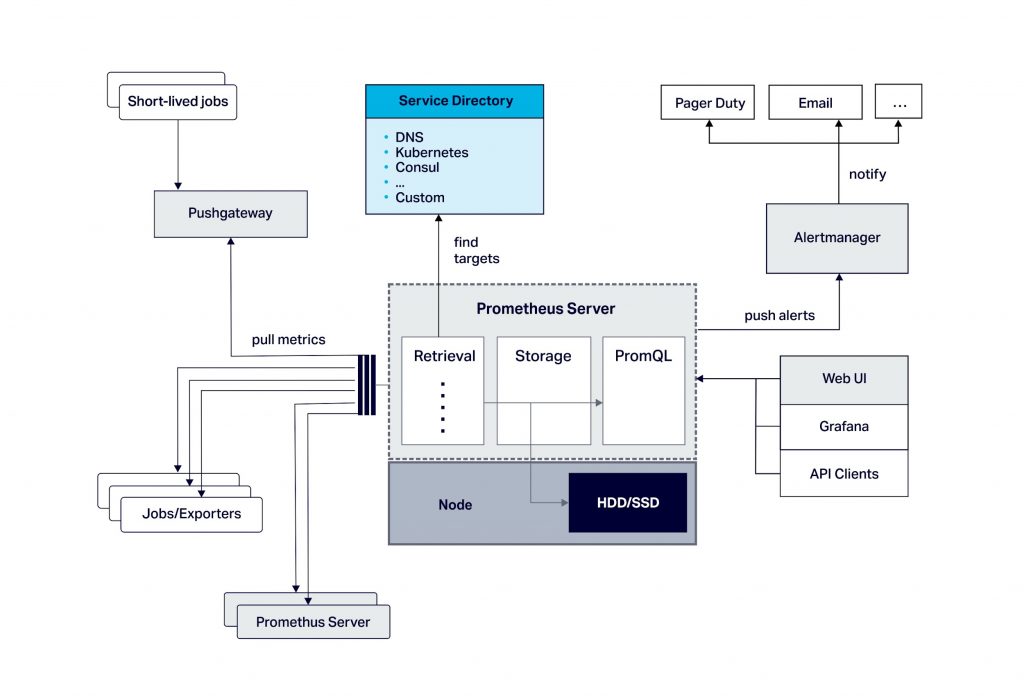
Prometheus will be run among longshoreman or Go applications. The watching code may be statistic information with a computer program (UI) and complex, versatile querying language known as PromQL.
Prometheus gathers metrics from instrumented jobs either directly or through an associate intermediator entree designed for temporary jobs. The samples square measure hold on domestically and scanned by rules so as to either collect and record a brand new statistic from the prevailing info or produce alerts. These metrics square measure then displayed by the manner of counters, gauges, and histograms. knowledge is transmitted by HTTP mistreatment plaintext or by additional economical protocols.
Features of Prometheus include:
- Various modes of graphing and Dashboard support;
- The prevalence of your time series assortment through a pull model over HTTP;
- A three-d information model that includes time-series information that’s known with a metric name or with key-value pairs (KVP);
- The ability to use PromQL to support the multidimensionality of the info model;
- Autonomous single server nodes and 0 reliance on distributed storage;
- Discovery of the target through static configuration or service discovery;
- And the ability to push statistics through AN treater entree.
Uses of Prometheus
IT departments use Prometheus to undertake to catch intrusions and problems in cloud environments as shortly as attainable it’s conjointly wont to gift website, service, and application knowledge and products info that’s relevant to website guests. The tool has been employed by firms like Boxever, Docker, Google, Red Hat, Weaveworks, CoreOs, Ericsson, and DigitalOcean.
Prometheus helps those running cloud-managed services, applications, and sites to confirm correct performance for purchasers apart from the sub-rosa work, Prometheus is vital for customer-facing functions similarly. The package displays relevant knowledge to customers concerning products, sales, reviews, and trends.
Benefits of Prometheus
Prometheus was designed to quickly diagnose issues. It will operate with each machine-centric watching and also the watching of extremely complicated service-oriented architectures. Its sturdy use in four-dimensional information assortment and querying is particularly useful.
Since the Prometheus server is freelance, it doesn’t get to believe remote services like network storage. this suggests it will still be used once alternative components of the infrastructure area unit are bad or broken. moreover, the development of a fancy, massive infrastructure is not sensible for its operation.
Learning Objectives
- Breakdown and understand the core components of the service
- Learn how to set up node exporters and a Prometheus monitor
- Learn the core features of the tool
- Understand and define the Prometheus monitoring tool
Intended Audience
DevOps engineers, site reliability engineers, and cloud engineers
Anyone looking to up their monitoring expertise with an open-source monitoring tool
Prerequisite(s)
To get the foremost out of this course, you ought to have some familiarity with watching tools. Expertise employing a Terminal, Git, the bash, or Shell would be useful however not essential.
Conclusion
In this course, we have a tendency to take a glance at the Tsar of observation tools – Prometheus is that the second hosted project within the Cloud Native Computing Foundation, right next to the instrumentality orchestrating software package – Kubernetes is an associate degree open-sourced system observation and alerting toolkit with extra capabilities in commission discovery.
If you want to learn relating to this course, I would suggest you visit DevOpsSchool.com.
Thank You!
Why Microsoft Azure Security Technologies getting so important?
Cloud computing is an innovation of computing world from all types of issues such as low storage capacity, huge investments, high operating costs, low security, huge maintenance, etc.
Microsoft Azure is in the one of the top cloud service providers in the market right now & growing at a faster rate with its unique features. Constant innovativeness, high flexibility and easy to use approach have acquired its huge popularity in the cloud computing segment. Azure is one of the widely deployed tolls by many organizations and offering more employment opportunities.
Azure Security Technologies
Azure Security Technologies is a security management system that strengthens the security posture of your data centers, and also provides advanced threat protection across your hybrid workloads in the cloud whether in Azure or not and also on premises.
Azure is a hybrid cloud service platform. It supports a wide variety of operating systems, computing languages, architectures, resources, applications, and computers.
Azure Security Technology addresses the three most urgent security challenges:
- Rapidly changing workloads.
- Increasingly sophisticated attacks.
- Security skills are in short supply.
To help users protected against these challenges, it provides tools to:
Strengthen security posture
It assesses user’s environment and enables to understand the status of resources, and whether they are secure.
Protect against threats
It assesses your workloads and raises threat prevention and security alerts.
Get secure faster
Everything is done in cloud speed. Because it is natively integrated, deployment of Security Centre is easy, providing you with auto provisioning and protection with Azure services.
Types of Services in Azure Security
For Azure data security and encryption best practices, the recommendations are around the services discussed below:
- General Azure Security
- Operations Security
- Applications Security
- Storage Security
- Network Security
- Backup and Disaster Recovery
- Identity and Access Management

Why is Cloud Technology getting so important?
Azure provides tools and capabilities for security to create a secure Azure platform. One of the cloud’s keys to data security is to prepare for future environments in which the data may exist and what protections are required for that state. Cloud provides significant benefits in addressing significant threats to information management.
In an on-site environment, organizations are likely to have unfulfilled responsibilities and limited resources available to invest in security, creating an environment where attackers can exploit vulnerabilities at all layers.
This will manage Docker-integrated Linux containers; develop Html, Python, .NET, PHP, Java, and Node.js apps; and develop backends for iOS, Android, and Windows computers. With more and more enterprises shifting to Azure cloud, there lies a definite need for Azure Security. Cloud storage eliminates the need to build data centers and invest in costly equipment.
Businesses are switching rapidly to cloud technology to speed up innovation and encourage collaboration. This is where Security Services comes into the picture. It is a procedure and technology that secure the cloud computing environment against cyberattacks.
AZ-500: Microsoft Azure Security Technologies

Master the skills required for the Microsoft Azure AZ-500 exam and gain security knowledge in Microsoft Azure.
AZ-500
This course is designed to help one master the skills required for the Microsoft Azure AZ-500 certification exam.
It is an associate-level exam which tests candidates for advanced security knowledge and experience working with various aspects of Microsoft Azure. In this course, you will progressively build and expand upon both your security knowledge and hands-on experience working with Azure technologies. This is not limited to: identity and security, hybrid cloud, monitoring, encryption, database security, and securing both apps and services for the Cloud.
More to go and more to run.
If you want to be a Certified Azure Security Engineer Associate and build your career in cloud computing, then I would suggest you DevOpsSchool, one of the best institute for Azure certification. DevOpsSchool offer Master in Microsoft Azure DevOps online and classroom training and certification course by an expert.
I hope this blog will helpful for you.
Thank you!!
What is AWS? Who can learn this certification course?
If you are new to the world of cloud computing, you will want to select a cloud platform that can help you easily get started with learning cloud computing. It is extremely important for one to familiarize themselves with various leading cloud service providers before deciding which cloud is best to get started with a career in cloud computing. Both AWS and Azure are solid performers with equivalence in almost 99% of the use cases.
What is AWS?
Amazon Web Services (AWS) is a secure cloud services platform, offering compute power, database storage, content delivery and other functionality to help businesses scale and grow. It is a subsidiary of Amazon providing on-demand cloud computing platforms.

AWS has significantly more services, and more features within those services, than any other cloud provider–from infrastructure technologies like compute, storage, and databases–to emerging technologies, such as machine learning and artificial intelligence, data lakes and analytics, and Internet of Things. AWS has the largest and most dynamic community, with millions of active customers and tens of thousands of partners globally.
Customers across virtually every industry and of every size, including startups, enterprises, and public sector organizations, are running every imaginable use case on AWS. It is architected to be the most flexible and secure cloud computing environment available today.
Here’s an overview of the certifications offered by AWS and capabilities an individual validates by completing these certifications.
AWS certifications offered include:

AWS Certified Cloud Practitioner
- Individuals are expected to effectively demonstrate a comprehensive understanding of AWS fundamentals and best practices.
AWS Certified Solutions Architect – Associate
- Individuals in an associate solutions architect role have 1+ years of experience designing available, fault-tolerant, scalable, and most importantly cost-efficient, distributed systems on AWS.
- Can demonstrate how to build and deploy applications on AWS.
AWS Certified SysOps Administrator – Associate
- This certification is meant for systems administrators that hold a systems operations role and have at least one year of hands-on experience in management, operations and deployments on AWS. They must be able to migrate on-premises workloads to AWS.
- They can estimate usage costs and identify operational cost control methods.
- Must prove knowledge of deploying, operating and managing highly available, scalable and fault-tolerant systems on AWS.
AWS Certified Developer – Associate
- This is for individuals who hold a development role and have at least one or more years of experience developing and maintaining AWS-based applications.
- Display a basic understanding of core AWS services, uses, and basic AWS architecture best practices.
- Demonstrate that they are capable of developing, deploying, and debugging cloud-based applications using AWS.
AWS Certified Solutions Architect – Professional
- Individuals in a professional solutions architect role have two or more years of experience operating and managing systems on AWS.
- They must be able to design and deploy scalable, highly available, and fault-tolerant applications on AWS.
- Must demonstrate knowledge of migrating complex, multi-tier applications on AWS
- They are responsible for implementing cost-control strategies.
AWS Certified DevOps Engineer – Professional
- Intended for individuals who have a DevOps engineer role and two or more years of experience operating, provisioning and managing AWS environments.
- They are able to implement and manage continuous delivery systems and methodologies on AWS.
- Additionally, they must be able to implement and automate security controls, governance processes, and compliance validation.
- Can deploy and define metrics, monitoring and logging systems on AWS.
- Are responsible for designing, managing, and maintaining tools that automate operational processes.
AWS Certified Advanced Networking – Speciality
- Intended for individuals who perform intricate networking tasks.
- Design, develop, and deploy cloud-based solutions using AWS
- Design and maintain network architecture for all AWS services
- Leverage tools to automate AWS networking tasks
AWS Certified Big Data – Speciality
- For individuals who perform complex Big Data analyses and have at least two years of experience using AWS.
- Implement core AWS Big Data services according to basic architecture best practices
- Design and maintain Big Data
- Leverage tools to automate data analysis
AWS Certified Security – Speciality
- Individuals who have a security role and at least two years of hands-on experience securing AWS workloads.
- Exhibit an understanding of specialized data classifications and AWS data protection mechanisms as well as data encryption methods and secure Internet protocols and AWS mechanisms to implement them
- Knowledge of AWS security services and features to provide a secure production environment
- An understanding of security operations and risk
AWS Certified Machine Learning – Speciality
- Intended for individuals in a development or data science role.
- Ability to design, implement, deploy and maintain machine learning solutions for specific business problems.
AWS Certified Alexa Skill Builder – Speciality
- Intended for individuals who have a role as an Alexa skill builder.
- Individuals have demonstrated an ability to design, build, test, publish and manage Amazon Alexa skills.
Where to Start
If you aren’t sure where to start, Best institute are a great way to help you get the ball rolling in your cloud certification journey, they offering comprehensive AWS certification course led by the experts in the programme. They trained and prepare you for the AWS certification exam. You will also learn the best practices to be followed while working on AWS projects in the industry. This Certification is completely hands-on and designed in a way to help you become technical expertise. I would like to suggest you some institutes which can meet your expectation. these institutes are:
And also if you are looking for Free online resources and quality training videos of AWS Certification on online platform like YouTube then you can also check ScmGalaxy and DevOpsSchool YouTube channel.
By ScmGlaxy
By DevOpsSchool
Good Luck !!!
What is DevOps and AZURE DEVOPS?
Introduction
Guys, today in this blog you will learn in detail about DevOps and Azure DevOps, so let’s know what is DevOps and Azure DevOps. DevOps is a term of the two words ‘development’ and ‘operations’. DevOps is not a technology, it is a combination of cultural, practices, and tools that increases an organization’s ability to deliver applications and services. Azure is one of the fast growing cloud computing platform. Microsoft Azure DevOps is built on multi-tier, scalable architecture. It is comprises a range of services covering the full development life-cycle.
What is DevOps?
DevOps is a software development methodology where the Development team & Operations team work as a together. After adopting DevOps, it helps to increase the speed of an organization to deliver applications and services. And it can be defined as the alignment of development and IT operations with better communication and collaboration. And those who are devops engineers use many tools for development & operations process so that our life becomes easy. Like these popular DevOps tools are:- Docker, Git, SVN, Maven, Jenkins, Selenium, Kubernetes, Puppet, Chef, SaltStack, Nagios, Splunk, etc.
How DevOps works in the Enterprise?
You can see through the image.

Works flow of DevOps
Below you can see works of DevOps by following each phase of the DevOps life cycle which includes continuous development, continuous integration, continuous testing, and continuous deployment.
• Continuous Development – Plan application objectives and code the requirements
• Continuous Testing – Verify the product for actual usage in a live environment
• Continuous Integration – It Plan tests and build the product
• Continuous Deployment – Ensures product is deployed with maximum accuracy
• Continuous Monitoring – It Monitor the product output and find the problem areas
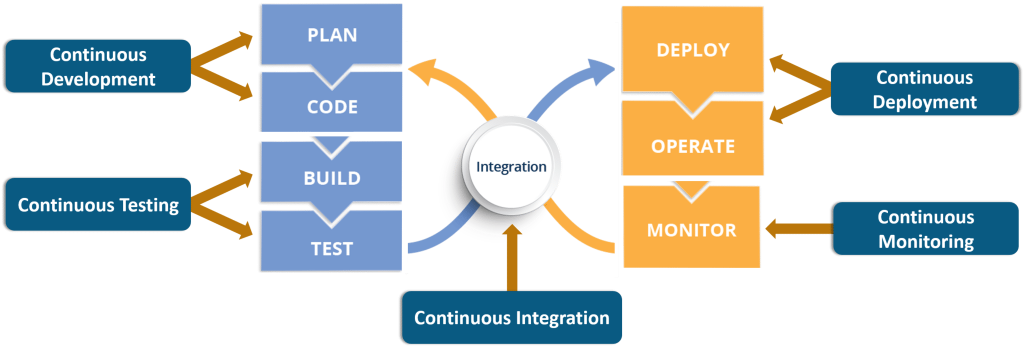
Here are the some Benefits of DevOps:-
- DevOps ideology encourages a completely new way of thinking and decision-making.
- DevOps certified professionals are among the highest-paid in the IT industry.
- The market demand is increasing rapidly with its increased implementation worldwide.
- It ideology promotes increased collaboration and communication between the operation and development teams.
- You learn to work in a team consisting of cross-functional team members—QA, developers, operation engineers, and business analysts.
Here you see Salary of DevOps Engineer:-
According to payscale.com, the demand for DevOps is high but companies require individuals to have the correct skill sets. Additionally, the better the experience, the higher is the salary. The average devops salary in India, according to Payscale, is Rs 674,202 per year, inclusive of bonuses and profit-sharing.
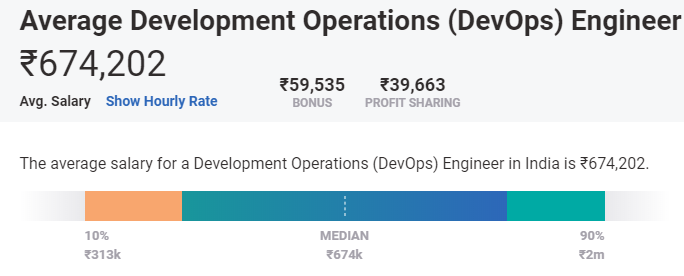
Below you can get complete knowledge of Microsoft Azure and Azure DevOps by source of DevOpsSchool.com.
What is Microsoft Azure?
Now, lets know about Microsoft Azure, It is a cloud computing service created by Microsoft that is one of the leading cloud service providers, and day-by-day many organizations are opting for Azure to get the best technologies for efficient computations. Its use will help you to build, deploy, and manage applications through your globally owned network of data centers.
What is Azure DevOps?
Now, lets know about Azure DevOps, it is a mixture of the simplest of technology and therefore the application of best practices. We can say, It is the Next Big thing in IT Industries. Azure DevOps is a Software as a service (SaaS) platform from Microsoft that provides an end-to-end DevOps toolchain for developing and deploying software. Microsoft recently launched this as a result of they perceive that DevOps has become more and more vital to a team’s success. It’s concerning culture and an amendment within the manner we tend to do things, yet as our mental attitude. Azure DevOps captures over fifteen years of investment and learnings in providing tools to support software packages, development groups. more to the present.
How does Azure DevOps work?
In the easiest terms, Azure DevOps is the evolution of VSTS (Visual Studio Team Services). Azure DevOps works both public and private cloud configurations – the services include:
- Azure Boards – A work tracking system with Kanban boards, dashboards, and reporting
- Azure Pipelines – A CI/CD, testing, and deployment system that can connect to any Git repository
- Azure Repos – A cloud-hosted private Git repository service
- Azure Test Plans – A solution for tests and capturing data about defects
- Azure Artifacts – A hosting facility for Maven, npm, and NuGet packages
Azure DevOps use cases include – 1. Planning 2. Developing 3. Delivery 4. Operations
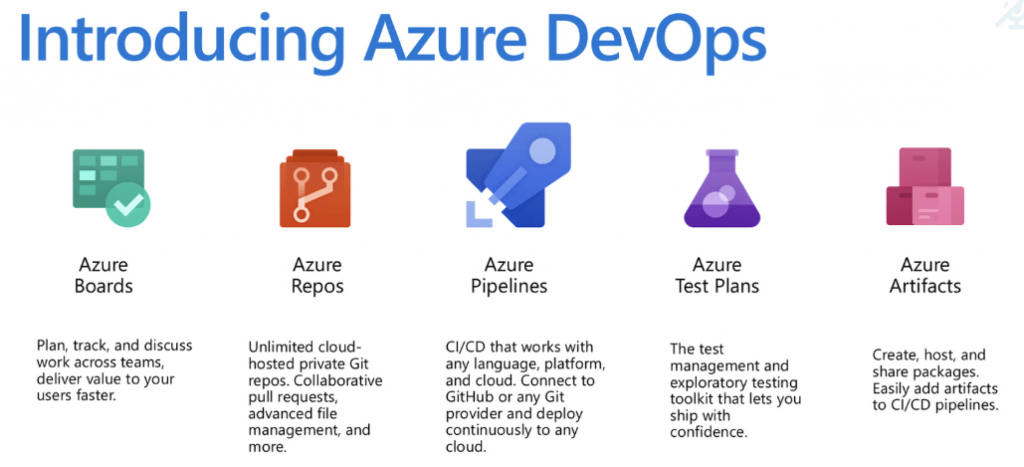
How to become a Azure DevOps Certified Engineer and list of the various certifications:–
If you want to become a Microsoft Azure DevOps Certified Engineer: then, you must earn at least one of the following: Microsoft Certified: Azure Administrator Associate, Microsoft Certified: Azure Developer Associate certification.
These are Best Microsoft Azure Certification:-
- Microsoft AZ-900 Certification: Azure Fundamentals course
- AZ-104 Azure Administrator Exam Certification course
- Microsoft AZ-400 Azure DevOps Certification course
- AZ-204 Developing Solutions
- AZ – 303 Microsoft Azure Architect
- AZ – 304 Microsoft Azure Architect Design
- Microsoft AZ-500 Certification: Azure Security Technologies course
Below you can path of Azure Certification:-
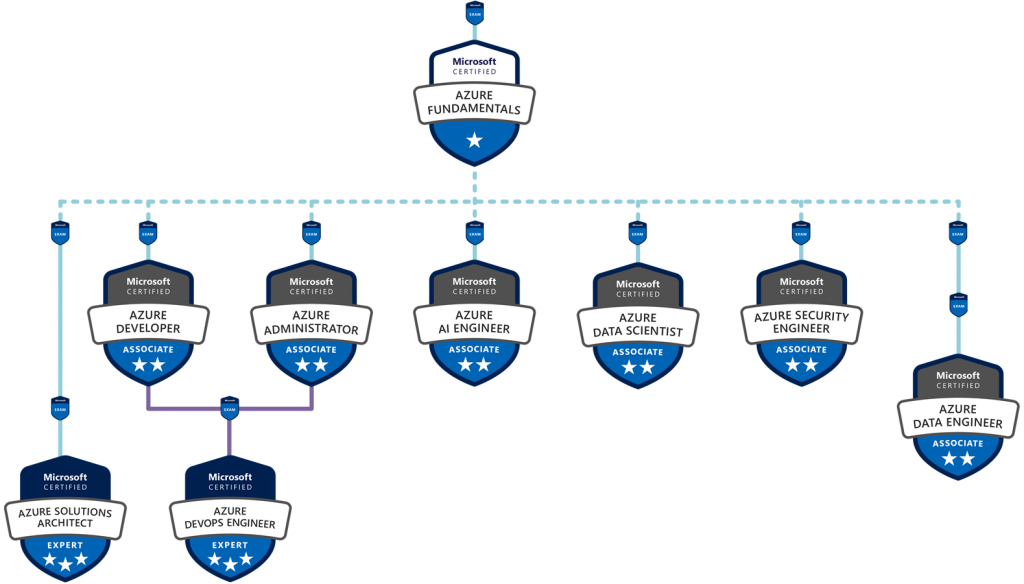
Pre-Requisites for Microsoft Azure course
- Basics of Networking
- Basics of the MS Azure Platform
- Basic concepts related to operating systems
- Basic familiarity with infrastructure paradigms such as active directory and PowerShell
What is the Salary of Azure DevOps Engineer?
Here I am going to share with you the average salary of an Azure DevOps Engineer. If you are working at a product-based company, then the salary ranges start from ₹16L to ₹42L per year. And the average salary of an Azure DevOps Engineer working at a service-based company can range start from ₹5.5L to ₹23L per year.
These are some Popular Courses of Azure:-
- Master in Azure DevOps Certification
- Master in Azure Architect Technologies
- Microsoft Azure Security Technologies
What are the Difference Between DevOps and Azure DevOps?
DevOps is basically a culture and it is really hot at the moment and is revolutionizing the workplace. It is the bridge closing the gap between Development and Operations team and bringing them together. DevOps is achieved through tools, processes, and automation, but, even more than that, through a change in organizational culture.
Azure DevOps is a Software as a service (SaaS) platform from Microsoft that provides an end-to-end DevOps toolchain for developing and deploying software. It is a mixture of the simplest of technology and therefore the application of best practices. Azure DevOps works both public and private cloud configurations.
If you are planning to become an Master in Azure DevOps Engineer, and searching to the best institute for preparing for Azure certifications, then I would suggest you one of the best Institutes that is DevOpsSchool.com. This institute has 10 to 15+ years of experienced trainers who providing you quality training with industries requirement.
I am going to share with you some videos, then you can get some overview of DevOps and Start to learn Azure DevOps course.
DevOps Fundamental to Advanced Tutorial for Beginners
Microsoft Azure Fundamental Tutorial | AZ-900 Certification
Why Choose DevOpsSchool | Reviews | Testimonials | Learner’s Feedback
I hope this tutorial is very helpful for you!
Keep learning! Best of Luck
Top 10 Cloud Platforms | List of best Cloud Platforms

Cloud computing is one of the trends which is going in IT industry these days. The traditional way of building IT environment is now shifting towards the cloud computing. This is the reason number of cloud service provider is increasing day by day and it becomes a tough task to select good one among-st them. So, In this article I am going to tell you about the top 10 cloud platforms for cloud services.
But, before that let’s have a quick overview on Cloud platforms?
Cloud platforms are platforms that allow developers to write applications that runs in the cloud and allows users to access data, services and applications, storage over the internet and allow them to work from anywhere on it.
If we look on to the benefits of cloud platforms than these are the following benefits
1. Reducing Costs – Cloud platforms eliminating the needs of own hardware, software, licenses, servers and other infrastructures which you needs to build IT working environment which ultimately reduce your costs.
2. Productivity – As you don’t need your hardware, software and on-premises servers which means you don’t need to hire experts to maintain them which helps you in both ways first on cost savings and second the professionals can focus on other things.
3. Availability – Cloud platforms allows you to access from anywhere, on any device 24/7
4. Scalability – The best thing about cloud platforms is that you don’t need to worry about high traffic or sudden growth on traffic because cloud platforms automatically provide as many servers as required in such situations.
5. Affordability – As we mentioned above about scalability of cloud platforms where service providers allow server as per situations but it’s not cost you much because it;s not compelling you to pay for unnecessary usage of servers by automatically reduces the numbers of servers when traffic go down. You need to pay only for that sort of time when service provider allocates extra servers.
6. Migration – Cloud platforms also allow users to migrate completely from one service provider to another without losing your data.
Now, let’s check on to the service models of cloud platforms
There are three models of cloud platforms
1. SaaS – Software as a service (Saas) applications runs completely in the cloud. It enables delivery of applications over the cloud, it means you don’t need to buy, install and maintain own software. Software is managed from a central location and Just pay for what you used.
2. PaaS – Platform as a service (PaaS) This kind of cloud platforms provides you set of tools and services designed to make coding and deploying those applications quick and efficient. Means to say you can develop, runs and manage applications on the cloud.
3. IaaS – Infrastructure as a Service (IaaS) It is a kind of service where you get access to virtualized computer resources over the internet. You can get complete infrastructure solutions like hardware, software, servers, storage and other things from third party.
Now, lets move on to the next section.
Here is the list of top 10 cloud platforms.
1. Amazon Web Services

- Service Model – IaaS
- Deployment Model – Hybrid, Private & Public Cloud
- Server operating system – Linux & windows
- Auto Scaling
- Block Storage
- VPN Access
- Cloud Storage
- Database as a Service
- Deploy servers
- DNS management
2. Microsoft Azure Cloud

- Service Model – PaaS
- Deployment Model – Private Cloud
- Server operating system – Linux windows
- Auto Scaling
- Block Storage
- Cloud Storage
- Content Delivery Network
- Deploy Servers
- Disaster Recovery
- VPN Access
- DNS Management
- Database as a Service
3. Google

- Service Model – IaaS
- Deployment Model – Public Cloud
- Server operating system – Linux & windows
- Cloud Storage
- Docker Support
- Load Balancing
- Firewalls
- Snapshots
- API (Application Programming Interface)
- Web Based Application/Control Panel
4. Rackspace

- Service Model – IaaS
- Deployment Model – Hybrid Cloud, Private Cloud, and Public Cloud
- Server operating system – Linux & windows
- Auto Scaling
- Block Storage
- Cloud Storage
- Content Delivery Network (CDN)
- Database as a Service
- Deploy Servers
- DNS Management
5. VMware

- Service Model – IaaS
- Deployment Model – Hybrid Cloud
- Server operating system – Linux & windows
- Auto Scaling
- Cloud Storage
- Load Balancing
- System Monitoring
- Web Based Application/Control Panel
- API (Application Programming Interface)
6. Salesforce

- Service Model – PaaS
- Deployment Model – Public Cloud
- Server operating system – Linux & windows
- Auto Scaling
- File Storage
- Firewalls
- Flexible Storage Services
- System Monitoring
7. Oracle

- Service Model – PaaS
- Deployment Model – Private Cloud and Public Cloud
- Server operating system – windows
- Block Storage
- Cloud Storage
- Database as a Service
- Object Storage
8. IBM

- Service Model – IaaS
- Deployment Model – Hybrid Cloud and Private Cloud
- Server operating system – Linux & windows
- Web Based Application/Control Panel
- API (Application Programming Interface)
- Messaging Services
9. Red Hat

- Service Model – PaaS
- Deployment Model – Hybrid cloud and Private Cloud
- Server operating system – windows
- Auto Scaling
- Horizontal Scaling
- Snapshots
- Vertical Scaling
- API (Application Programming Interface)
- Command Line
- Graphical User Interface
10. Heroku

- Service Model – PaaS
- Deployment Model – Public Cloud
- Server operating system – Linux & windows
- Auto Scaling
- Horizontal Scaling
- Control Interface-Command Line
So, this is my list of top cloud platforms which are trending these days. But, if you think about some other platforms than feel free to share with us in the comment section below.
Top Cloud computing and operating software
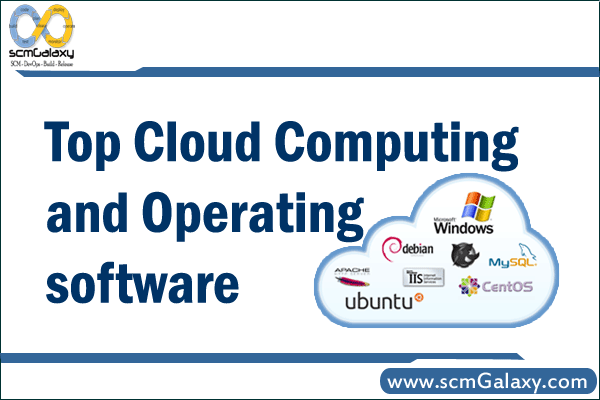
Top Cloud computing and operating software.
OpenStack is a free and open-source cloud-computing software platform.[2] Users primarily deploy it as an infrastructure-as-a-service (IaaS). The technology consists of a group of interrelated projects that control pools of processing, storage, and networking resources throughout a data center—which users manage through a web-based dashboard, through command-line tools, or through a RESTful API. OpenStack.org released it under the terms of the Apache License.
CloudStack is an open source cloud computing software for creating, managing, and deploying infrastructure cloud services. It uses existing hypervisors such as KVM, VMware vSphere, and XenServer/XCP for virtualization. In addition to its own API, CloudStack also supports the Amazon Web Services (AWS) API and the Open Cloud Computing Interface from the Open Grid Forum.





